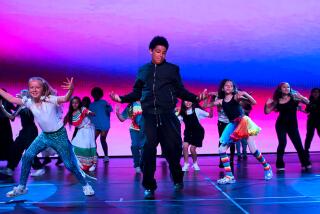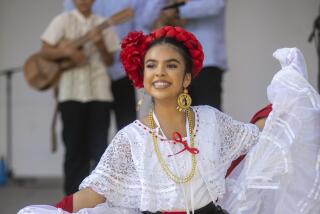DANCE REVIEW : Aman Troupe Brings Folk Traditions to Arts Center
- Share via
There are, reportedly, more than 80 languages spoken by the children in Southern California grade schools. Such linguistic variety may be a nightmare for the educational system, but it can be a bonanza for a company such as the Aman Folk Ensemble, which is dedicated to preserving the artistic traditions of many cultures.
A sizable audience, including children, showed up when the Los Angeles-based company appeared Sunday at the Orange County Performing Arts Center in Costa Mesa as part of the Imagination Celebration. The emphasis, though, was mostly on central and eastern European and American cultures, which are only a part of the company’s extensive repertory.
For the record:
12:00 a.m. May 11, 1988 For the Record
Los Angeles Times Wednesday May 11, 1988 Orange County Edition Calendar Part 6 Page 9 Column 1 Entertainment Desk 2 inches; 38 words Type of Material: Correction
In a May 3 review of the Aman Folk Ensemble at the Orange County Performing Arts Center in Costa Mesa, one of two vocal soloists was identified incorrectly because of an error in the program provided by the company. In fact, the soloists were Robyn Friend and Deanne Sparks.
The Aman members danced with authority, spirit and precision, from the vigorous, harsh dances of Bosnia--in which women are watched carefully for heavy breathing (a sign of tuberculosis)--to the fluid, kaleidoscopic floor and social patterns in the Appalachia suite.
Highlights included the men’s virtuoso high-stepping, boot-slapping steps, imitated by the women (dances from Southern Romania), and humorous little wobbly head movements and slide-shuffles in Northern Romanian dances.
Throughout, the Aman musicians switched deftly and stylishly from hammered dulcimer to fiddle-family ensembles to Turkish long-necked lutes and goblet-shaped drums. As usual, the singing, particularly of soloists Deanne Sparks and Coskun Tamer, was richly plangent and expressive. The wide variety of traditional costumes was striking in color and pattern.
Artistic director Barry Glass provided informative and occasionally wry commentary on the cultural traditions of the regions.
For all its serious intent in safeguarding these traditions, however, Aman still set up a barrier to appreciation by failing to provide translations.
One would have liked to know, for instance, exactly what poignant sentiments were expressed in the young Hungarian soldiers’ song, what the Yugoslav woman’s ballad was about, or, for that matter, what Glass sang in the Cajun dialect of French during the Louisiana suite.
Without knowing the words, one could regard these cultures and peoples as if they were under glass--distant, curious and safe objects of appraisal--which hardly squares with the dedicated, lively Aman spirit.
More to Read
The biggest entertainment stories
Get our big stories about Hollywood, film, television, music, arts, culture and more right in your inbox as soon as they publish.
You may occasionally receive promotional content from the Los Angeles Times.










